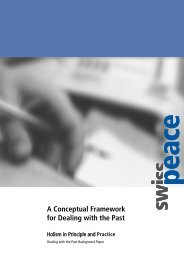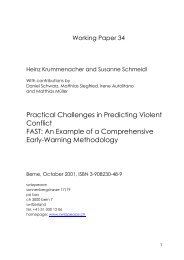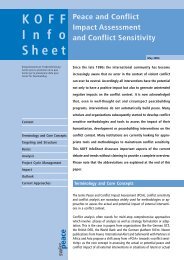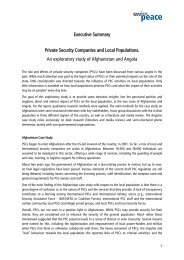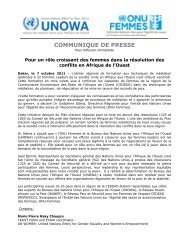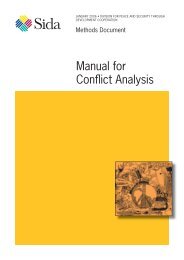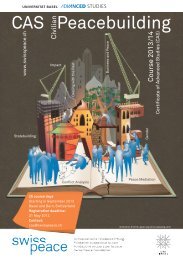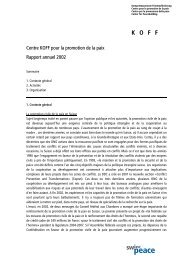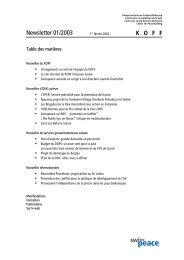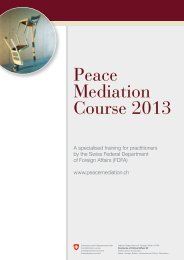Unpacking the Mystery of Mediation in African Peace ... - Swisspeace
Unpacking the Mystery of Mediation in African Peace ... - Swisspeace
Unpacking the Mystery of Mediation in African Peace ... - Swisspeace
You also want an ePaper? Increase the reach of your titles
YUMPU automatically turns print PDFs into web optimized ePapers that Google loves.
Nor<strong>the</strong>rn Uganda, Juba Negotiations<br />
here that <strong>the</strong> ICC does not seek to have a political<br />
role or to <strong>in</strong>fluence peace processes. Ra<strong>the</strong>r, <strong>the</strong><br />
ICC has a legal mandate via <strong>the</strong> Rome Statute,<br />
and its primary aim is to promote accountability<br />
for <strong>in</strong>ternational crimes and to contribute to prevent<strong>in</strong>g<br />
such crimes <strong>in</strong> <strong>the</strong> future. Never<strong>the</strong>less,<br />
<strong>the</strong> ICC does have an impact on <strong>the</strong> dynamics <strong>of</strong><br />
a peace process, even if this is un<strong>in</strong>tended.<br />
There are multiple arguments about <strong>the</strong> role <strong>the</strong><br />
ICC <strong>in</strong> Nor<strong>the</strong>rn Uganda, but what is <strong>of</strong> <strong>in</strong>terest<br />
<strong>in</strong> this context are its practical implications on <strong>the</strong><br />
Juba talks. Four po<strong>in</strong>ts can be mentioned <strong>in</strong> this<br />
regard. First, <strong>the</strong> ICC changed <strong>the</strong> <strong>in</strong>centive<br />
structure <strong>of</strong> <strong>the</strong> parties. The arrest warrants have<br />
<strong>in</strong>creased <strong>the</strong> pressure on <strong>the</strong> LRA and have made<br />
it more attractive for <strong>the</strong> group to redeem itself<br />
via participation <strong>in</strong> peace talks. Thus, <strong>the</strong> ICC<br />
has contributed to br<strong>in</strong>g<strong>in</strong>g <strong>the</strong> LRA to <strong>the</strong> negotiat<strong>in</strong>g<br />
table. 173 Second, <strong>the</strong> ICC <strong>in</strong>fluenced <strong>the</strong><br />
choice <strong>of</strong> a mediator. Countries that are party to<br />
<strong>the</strong> Rome Statute have an obligation to extradite<br />
persons for whom <strong>the</strong> ICC has issued an arrest<br />
warrant. Therefore, it was logical that <strong>the</strong> talks<br />
would take place <strong>in</strong>, and be mediated by, a nonsignatory<br />
country <strong>in</strong> <strong>the</strong> region. Third, <strong>the</strong> ICC<br />
<strong>in</strong>fluenced <strong>the</strong> structure <strong>of</strong> <strong>the</strong> negotiations. As<br />
<strong>the</strong> LRA leadership was highly concerned about<br />
<strong>the</strong> ICC <strong>in</strong>dictments, a substantial part <strong>of</strong> <strong>the</strong><br />
talks concentrated on issues <strong>of</strong> reconciliation and<br />
accountability. F<strong>in</strong>ally, <strong>the</strong> ICC made it more<br />
difficult to satisfy <strong>the</strong> LRA’s security concerns,<br />
given that <strong>the</strong> ICC arrest warrants will persist,<br />
even after <strong>the</strong> signature <strong>of</strong> a peace agreement.<br />
This complicated <strong>the</strong> conclusion <strong>of</strong> <strong>the</strong> Juba<br />
talks. 174<br />
173 ICG (2007): op.cit.<br />
174 See Schomerus, Mareike: “International Involvement<br />
and Incentives for <strong>Peace</strong>mak<strong>in</strong>g <strong>in</strong> Nor<strong>the</strong>rn Uganda”,<br />
<strong>in</strong>: Accord, no. 19 (2008).<br />
Implementation and Assessment<br />
Even though <strong>the</strong> Juba talks were concluded <strong>in</strong><br />
March 2008, no f<strong>in</strong>al peace agreement has been<br />
signed and <strong>the</strong> future <strong>of</strong> <strong>the</strong> peace process <strong>in</strong><br />
Nor<strong>the</strong>rn Uganda rema<strong>in</strong>s unclear. However, it<br />
would be wrong to call <strong>the</strong> Juba talks a failure. In<br />
fact, <strong>the</strong> talks have produced significant humanitarian<br />
dividends. As a result <strong>of</strong> <strong>the</strong> cessation <strong>of</strong><br />
hostilities and <strong>the</strong> concentration <strong>of</strong> LRA fighters,<br />
<strong>the</strong> security situation has markedly improved,<br />
mak<strong>in</strong>g it possible for half <strong>of</strong> <strong>the</strong> 1.8 million<br />
IDPs <strong>in</strong> Nor<strong>the</strong>rn Uganda to return to <strong>the</strong>ir<br />
homes. 175 In addition, <strong>the</strong> Juba talks have produced<br />
a series <strong>of</strong> substantive agreements, which<br />
provide a bluepr<strong>in</strong>t for a political settlement with<br />
<strong>the</strong> LRA as well as for address<strong>in</strong>g <strong>the</strong> root causes<br />
<strong>of</strong> <strong>the</strong> conflict <strong>in</strong> Nor<strong>the</strong>rn Uganda. Moreover,<br />
<strong>the</strong> Juba peace talks have attracted <strong>in</strong>ternational<br />
attention and helped mobilize resources for build<strong>in</strong>g<br />
peace <strong>in</strong> Nor<strong>the</strong>rn Uganda.<br />
Outlook<br />
In June 2008, Riek Machar made a series <strong>of</strong> recommendations<br />
regard<strong>in</strong>g <strong>the</strong> future <strong>of</strong> <strong>the</strong> Nor<strong>the</strong>rn<br />
Ugandan peace process. In his report, Machar<br />
enumerates different measures that he believes<br />
could br<strong>in</strong>g <strong>the</strong> peace process back on track. He<br />
advocates a cont<strong>in</strong>ued engagement with <strong>the</strong> LRA.<br />
He also suggests that certa<strong>in</strong> elements <strong>of</strong> <strong>the</strong> various<br />
Juba agreements, <strong>in</strong> particular <strong>the</strong> one on<br />
comprehensive solutions <strong>of</strong> <strong>the</strong> marg<strong>in</strong>alization <strong>of</strong><br />
Nor<strong>the</strong>rn Uganda, should be implemented, and<br />
asks <strong>the</strong> <strong>in</strong>ternational community to harness sufficient<br />
resources for this purpose. 176<br />
175 Internal Displacement Monitor<strong>in</strong>g Centre: “Uncerta<strong>in</strong> Future<br />
for IDPs while <strong>Peace</strong> Rema<strong>in</strong>s Elusive” (24 April 2008),<br />
(http://www.<strong>in</strong>ternal-displacement.org/).<br />
176 Machar, Riek: “Report and Recommendations <strong>of</strong> <strong>the</strong> Chief<br />
Mediator <strong>of</strong> <strong>the</strong> <strong>Peace</strong> Process between <strong>the</strong> Government <strong>of</strong><br />
Uganda and <strong>the</strong> Lord’s Resistance Army” (16 June 2008),<br />
(http://www.beyondjuba.org/peace_agreements.php).<br />
65




